Chinese word of the
day: 随便
(suí biàn literally "follow convenient") = casual, careless, wanton,
willful, as one pleases.
April 30, 2010
Culture Shock Again?
Before I came to China, I thought I was immune to culture shock.
Culture shock is only for the squeamish. I was ready to eat bugs,
or see live chickens dispatched in the market. No problem.
But since then I've come to appreciate that culture shock can be much
more subtle than the truly shocking. Culture shock is happening
anytime I'm thinking: What is wrong with these people?
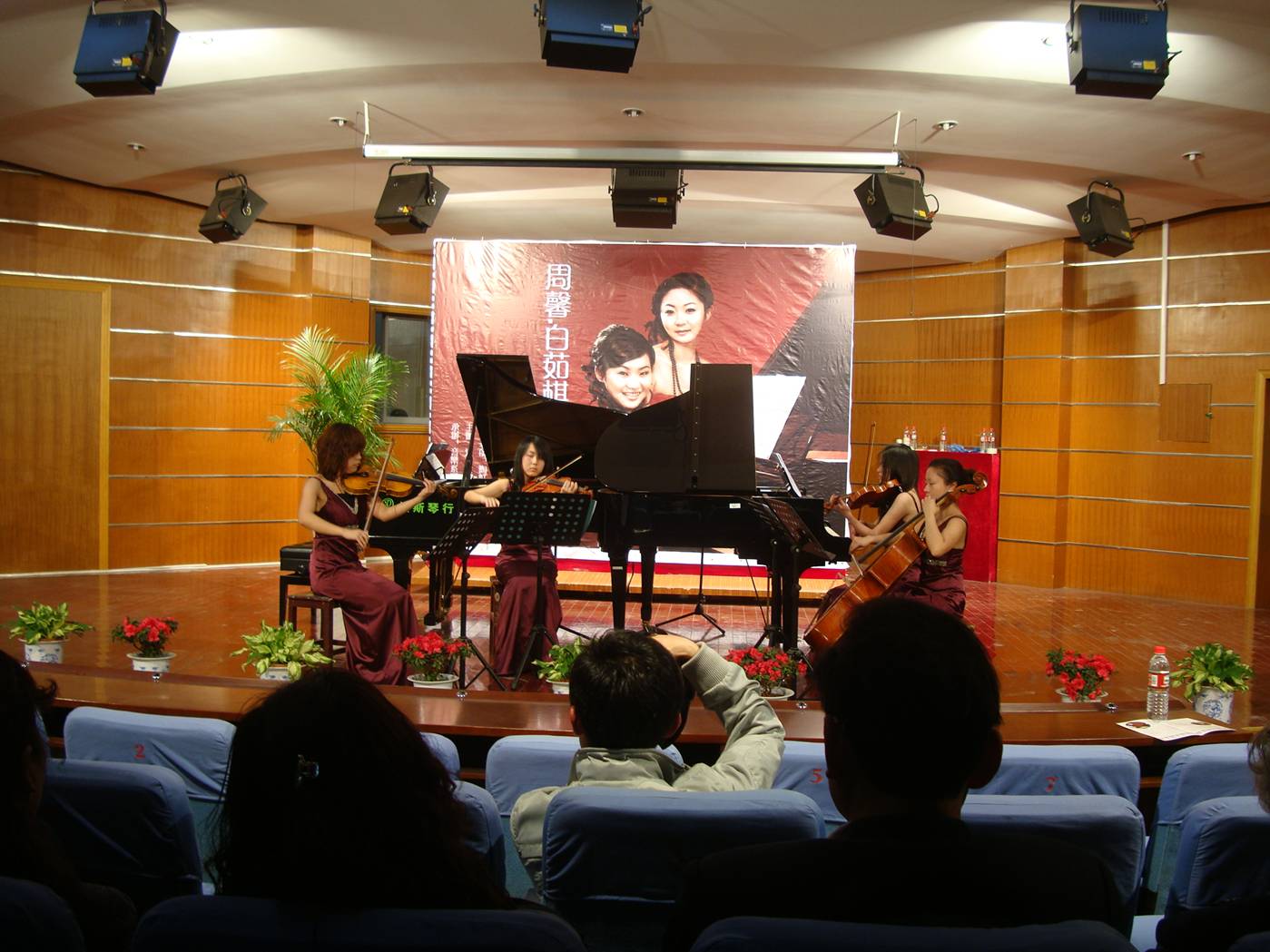
Wednesday
evening this week
we
attended a concert on campus. Delightful music played on two
pianos, with a string quartet playing Pachelbel's Canon,
one of our favorite pieces, thrown in for variety. But all through
the performance, people in the audience were talking. Not in
whispers, but in a normal voice, like they were listening to a CD in
their kitchen. For me it was like listening to a radio tuned
between stations, or like that old Simon and Garfunkel version of
"Silent Night" with the world news broadcast mixed in for irony. I
found myself getting angry. What is wrong with these people?
But that's the wrong question. The question is, what's wrong with
me? This is their country, and their culture. None of the
Chinese in the audience seemed the least bit concerned. Most were
having their own conversations at times. If they take a much more
casual approach to music concerts than is the norm in my uptight
culture, who am I to be critical, or to try to correct them.
The audience called for an encore, and it was great to
hear Scott Joplin's "The Entertainer" played as a duet in China. I
need to adjust my attitude. Again.
Comment on this Post
Sex Education in
Chinese Schools
I'm
told there is no sex education in Chinese schools, or if it happens it's
because of the initiative of an individual teacher. I took another
poll of my students and was surprised to find strong support for the
idea. One class was unanimously in favour.

Sex of course
is physically, emotionally, and socially dangerous. I tell my
students that sex is much more dangerous now than it was when I was
their age. Back then you could catch a disease, but the disease
could be cured. Now sex can kill you.
It seems to me that ignorance increases any danger.
If, like my dog, you don't know enough to look both ways before crossing
the road, doing so is very dangerous. Once you know how to deal
with it, the road becomes pretty safe. Never completely safe, of
course. There's always the chance that a drunk could swerve and
get you while you walk down the sidewalk. But a lot safer than if
you haven't been taught how to minimize the danger. Knowledge
reduces danger for just about anything, yet sex education in schools is
still a very controversial issue in many regions of North America.
My class this week was a chance to introduce the
students to some vocabulary they're not likely to have encountered
before. Words like puberty, abstinence, condom, genitals,
pedophile, deviants, perverts, predators, menstruation. I didn't
talk about specific practices, fetishes, or even variations. But I
did try to explain the sex education issue and why there is a
controversy over it. Leaving aside those who believe that sex
education belongs with the parents, despite the fact that many parents
are ignorant or too uptight to accomplish any real education, it comes
down to the question of what should be taught, and when.
There are those who say that there is no such thing as
safe sex, and therefore the only thing to teach children is that sex is
bad and dangerous and don't do it. Abstinence. The other
side believes that trying to stifle one of humanity's strongest drives
simply doesn't work, results in things like priests molesting orphans,
and that a certain percentage of young people will have sex no matter
what they are told. Thus harm reduction is the only sensible
approach - education about contraceptives and condom use.
There are those who would delay introducing the topic
until just before marriage, those who would introduce it just before or
just after puberty, and those, like myself, who believe that sex
education in an age appropriate form should begin in kindergarten.
I'm not out to destroy the innocence of childhood.
But ignorance is not innocence. The first question a pedophile
asks a child is what his or her genitals are called. If the child
doesn't know, or knows only the childish euphemisms such as "wee wee" or
"thing", then the predator knows that child has no adult in their life
that they talk to about their body. It marks a child as "safe", a
potential victim, and that makes the child more vulnerable. Three
year olds should know where babies come from, how they happen, and what
the various body parts involved are called, both technically and in
street language. They should be taught what behavior from an adult
is appropriate, and what is not. They don't need to be frightened
of strangers, but they do need to know that they can tell adults
anything and be believed.
Speaking of talking to strangers, the best thing a
child can do in a situation where they are lost or confused is to pick a
stranger to talk to. Children have pretty good instincts.
The chances of picking a predator are miniscule, but a child who looks
alone and frightened is a target.
Comment on this Post
Chinese word of the
day: 玉米花 or 爆米花
(yù mǐ huā or bào mǐ huā literally "corn flower" or "explode corn
flower") = popcorn

April 25, 2010 Job Fair
for Foreign Professionals in Nanjing
This past
Friday afternoon we boarded a chartered bus at the North gate and set
off for Nanjing, where we enjoyed a delicious buffet dinner, an evening
of exploring, and a night in a five star hotel as guests of the Jiangsu
Provincial Bureau of Foreign Experts Affairs. Saturday morning
found us part of the crowd attending the Yangtze River Delta Job Fair
for Foreign Professionals.


Since we're
not looking for a job, we went out of curiosity and for a night on the
town in Nanjing. But the job fair turned out to be more
interesting than I expected. We were given a welcome package that
included a dinner and breakfast voucher for the hotel, plus a thick book
of "Requests for Foreign Experts" - job openings. These ranged
from the standard English teacher positions to "Specialist on fish and
shellfish (clam) breeding, able to speak English and Japanese.", with
all manner of engineering and medical specialties in between.


Most of the
booths at the actual fair were from universities and schools, though a
whole row had all their posted information only in Chinese and were
obviously looking for foreigners who know the language.


It's
one of the mysteries of China: Why, with so many foreigners available,
does the embarrassing Chinglish still
show up so frequently on Chinese signs? ( May this situation never be
improved.)
This was my first time at this kind of job fair, and I
came away impressed. It was interesting to talk to so many
potential employers in one location. If I really was looking for a
job, this would be the place to be.
Comment on this Post
And Afterwards another
Mystery of China:
Before the bus
took us back to Wuxi, we had an hour of wandering in the temple market
area. As usual it was fun to look for the unusual amidst the standard
tourist gack. I picked up a couple of silk tai chi suits, which I
will use as pajamas on occasion. Here's the scene:

This
is the temple market. Exactly the same layout and shops can be
found in most cities in China. But there's a guy in the corner
with a red plastic bucket and he's cleaning something at the water tap.
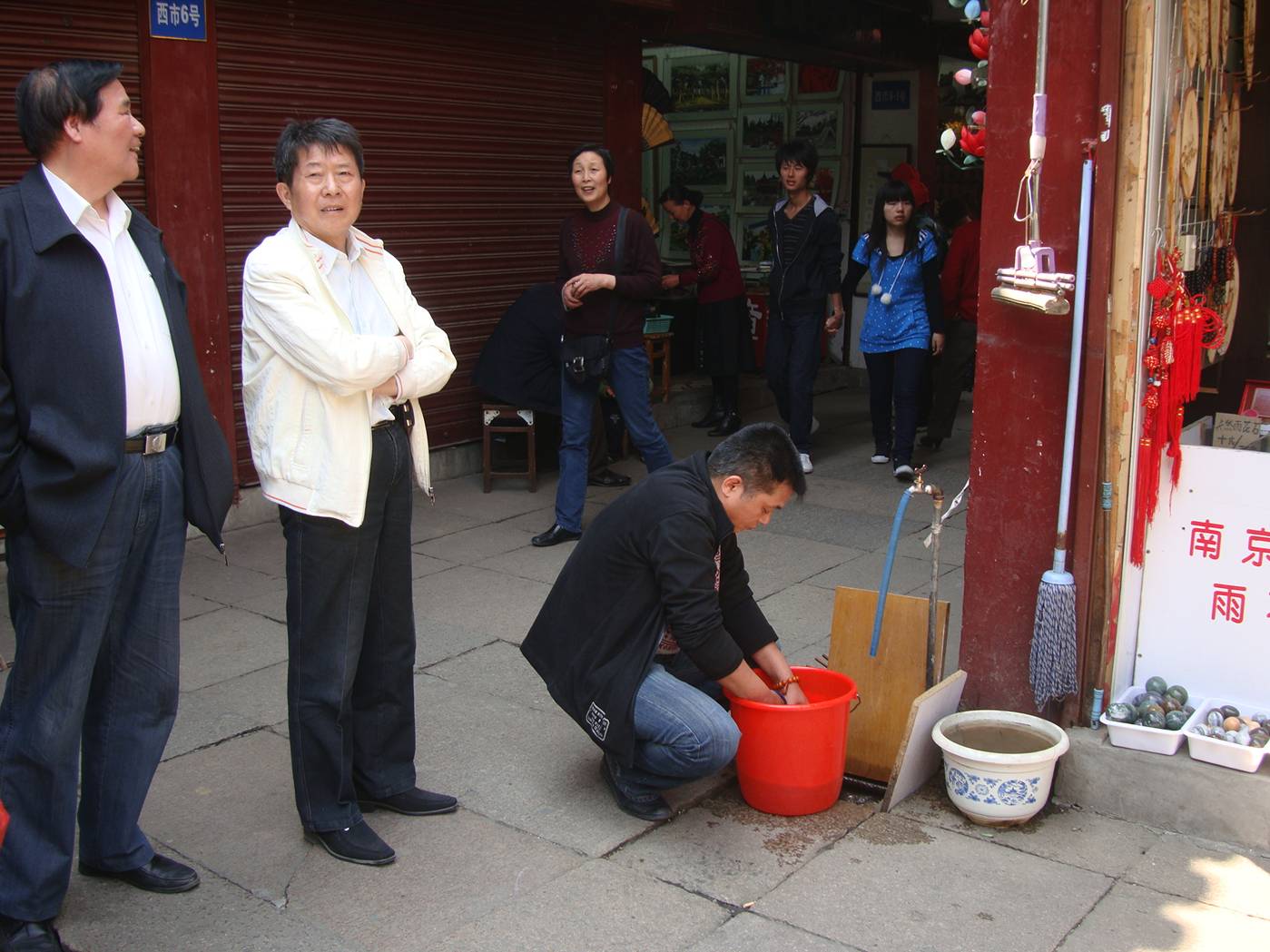
So the
question is, what's in the bucket?

And the answer
is dinner, in the shape of a very dead turtle. But why here?
Why now? Doesn't he have a kitchen? Is this for a
restaurant? Doesn't the restaurant have a kitchen? Why at a
water tap in the corner of a downtown market crowded with tourists?
So many questions, and just one more of the sights that make China so
endlessly fascinating.

Can
anything feel more elegant than silk? 120 RMB ($17.50 CDN)
complete with trousers.
No doubt there will be those who say I overpaid, but bargaining can only
go so hard before
my conscience kicks in. There's a huge amount of hand work in this
garment.
Comment on this Post

Chinese word of the
day: 乌龟蛋
(wū guī dàn literally "turtle egg") = bastard (slang)
April 22, 2010 More
Liberal than I Expected
Today my News Reading for
non-English Majors class read a story in their textbook from
The
Economist,
May 3, 1991, about exotic dancers in a San Francisco sex club
who went on strike to form their own union. The textbook suggested
two discussion questions: 1. Should stripping be considered a legitimate
profession and 2. Should stripping be allowed (I'm told it isn't allowed
in China.)
After the students had a few minutes for discussion, I
took an informal vote. Much to my surprise, the class turned out
to be far more liberal than I expected. I really didn't think we'd
get a single vote for allowing strippers to work, or for calling it a
legitimate profession.


One of the girls did a nice
job of summing up her argument for allowing strippers to work - banning
them only drives them underground where they are harder to control and
can't be protected by the law. But as you can see, the vote was
far from unanimous.
I asked one of the opposing students why he felt that
stripping should be illegal. He said that it's a moral issue, and
that it's traditional in China to take this position. I explained
the western view, or at least the liberal western view, that the
government doesn't exist to enforce morality. After all, there are
moralists in Canada and America who would make dancing and wearing
makeup illegal.
That
student also told me that morality comes from God, which I suppose means
that an atheist like myself can't possibly have any morals. Of
course I strongly disagree. I don't think I need God, or the
threat of eternal punishment, to tell me whether something is right or
wrong. It's surprising to hear this argument from a student in an
officially atheist country.
I also pointed out that many
things were traditional in the past which are not allowed today, such as
the beating of wives, cock fighting, and dueling. Some things that
were illegal in the past, such as blasphemy and homosexuality, are now
legal, at least in Canada. So tradition seems a weak argument for
a law.
Getting students to argue with me in class can be frustrating.
This is very much against the Chinese educational tradition. In
China, the teacher is the one who has the wisdom, and the students are
expected to soak that wisdom up so that they can regurgitate it on the
exam. The idea of arguing with a teacher is really foreign to
them.
Comment on this Post

Chinese word of the
day: 制片人
(zhì piàn rén literally "system component person") = movie producer
April 20, 2010 Home
from another Outing
This past weekend we were
again treated to a whirlwind tour of scenic China, this time to the
famous West Lake of Hangzhou.

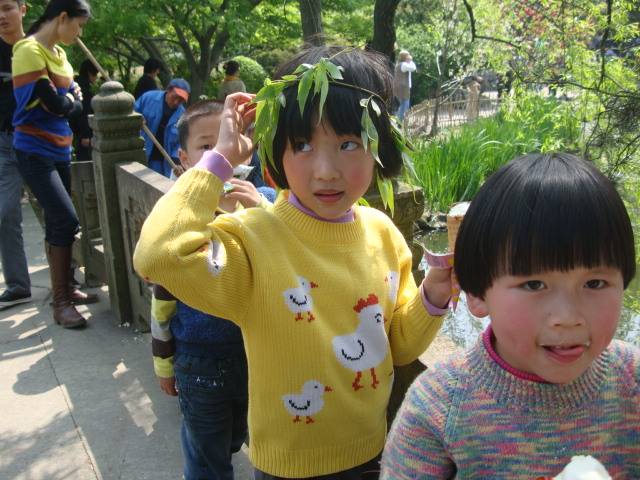
It was a bright and clear day, the
first for weeks, and the park around the lake was crowded.



The Chinese writing says: "railing
side please pay attention security" but you have to admire the terse
English translation.
 |
 |
|
Sometimes I really resent what the
Nazis did to a perfectly good symbol of "perfect virtues and merit". |
I neglected
to thank this guy for holding my
picture frame square with his forehead. |
The next stop after West Lake was a Xixi Wetlands park, also very
crowded but serenely enjoyable once we were on the boat and touring the
waterways.
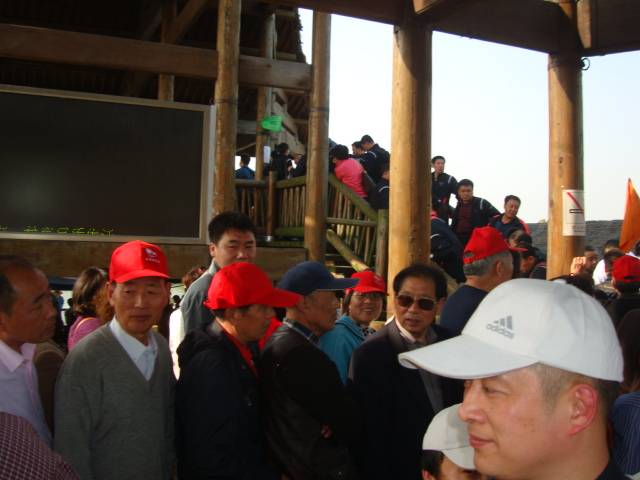


Jim
claims this is why he has no motivation to lose weight. His Buddha
persona is a chick magnet here.
In the very long lineup for the boat
cruise through the wetlands, Jim was constantly invited to pose for
pictures.


The next day we stopped at a bamboo forest park, called the Bamboo Sea,
in Wuxi. It was raining a bit, and the crowds were thinner.
The air in in the bamboo was delightful, and a sign informed us that it
was ionized by the foliage and that breathing deeply for fifteen minutes
would make one relaxed and energetic.


I really would love to get a
container load of timber bamboo back in Canada just so I could play with
it and build some covered walkways and gazebos. I'm particularly
impressed with bamboo roofs. They seem so simple and functional.

The writing on the rock inform us that
this is the source water for Tai Hu, the big lake near our campus.
After the park we went to a
restaurant that specialized in wild game from the mountain, featuring
wild rabbit, wild mountain chicken, mountain goat, hedgehog, and cicada.
I could eat cicada all day, but most of the company was much more....
okay, the only word I can think of is "revolted" by the bugs.

Our final stop on the way
home was the Violet Sand Earthenware Village, a ceramic district near
Wuxi, where we watched artisans making teapots and these little guys
caught my attention. They are Jinchan (gold toads), which will
supposedly help the owner hang on to his money. They have a cute
trick, demonstrated below, of changing colour when hot water is poured
over them




Once again our wonderful
administration gave us a weekend to remember, complete with
accommodations in a five star hotel and food we've never had before,
even after almost six years in China. Thank you Ms. Liu, Michael
Bian, Mr. Ding and all the staff of the International Office.
Comment on this Post

Chinese word of the
day: 混响
(hùn xiǎng n. literally "mix loud") = reverberation
April 14, 2010 Talking
about Acoustics
The whip is finished, and it
serves the only possible purpose a whip can serve for me in this day and
age, since I don't have a bull to whip and am not attracted to
S&M. My new bullwhip makes a great demonstration prop for a
discussion of acoustics. Last week I promised my classes that I
would break the sound barrier, and that's what I've been doing.

Double click on the picture above to see
the demonstration of breaking the sound barrier.


The ball at the end of the handle is now a
scobie hitch. I liked the look of the Turk's-head better.
But with the wrist strap coming out on each side, a Turk's-head turned
out to be impossible to balance and tighten. It would come off for sure.
The scobie hitch is on for good.
Comment on this Post
My Whip Story
I first owned an Australian kangaroo hide bullwhip back in the mid
seventies. At the time I was an active member of the Thunderbird
Fast Draw club, which met on Sundays at a local indoor range and turned
the air blue with black powder smoke. We had Bob Mernickle, the
world champion at double balloons, in the club. He could draw a
single action pistol and fire two rounds, breaking two balloons ten feet
apart, in twenty-two one hundredth of a second. It takes about
fifteen one hundredths of a second to blink your eyes, so Bob was fast.
Guys like Bob paid a lot of attention to their guns,
which were altered for fast draw with aluminum barrels and cylinders and
would probably blow up if a real round was put through them. Bob
would sit for hours, watching television, cleaning and polishing his
gun. A request to handle or inspect Bob's gun would be met with a
cold refusal, as if you had asked to fondle something more intimate than
a cold piece of steel and aluminum.
On my first visit to the club with the whip, Bob asked
if he could try it. We went out on the driveway behind the
clubhouse. Bob drew his hand back and then jerked it forward,
which is not the smooth motion one makes to get the whip to crack.
The whip responded by picking his gun up out of his holster and dropping
it on the gravel driveway. I don't think he could have done that
on purpose if he tried for a month.
That should give you some idea of how tricky a bullwhip
can be, and it explains why I'll demonstrate for my students, but none
of them get to give it a try. My new whip could take out an eye
with no trouble at all.
Comment on this Post
People in the Pasta -
the Terminal 'A' problem.
The Chinese language has no words at all that end in a hard consonant,
like 'd' or 't'. So the tendency for Chinese students of English
is to add an 'a' and soften the sound. Thus "last Spring" becomes
"lasta Spring" and "past" becomes "pasta".
I'm always looking for a way to impress on my students
the importance of not adding that extra syllable. Today I explained what
pasta is, and drew a rather crude picture of what "people in the pasta"
might look like.

I'm hoping this kind of connection will make them more careful about
adding that terminal 'a' to words.
Brand New Bund, Brand
New Chinglish
They are dressing up Shanghai
for Expo 2010, which opens in less than a month now. Part of the
beautification has been done on the famous Bund, the walk along the
river. It's been widened, and simplified to make a long pedestrian
walkway.

And below is the sign
directing tourists to the toilets.

Amazing to me that, with all
the native speakers in China now, they don't verify that a sign is
correct BEFORE they pay to have it made, but I hope they never catch on.
I love the Chinglish. It's one of the most entertaining aspects of
China.
Comment on this Post

Chinese word of the
day: 驯服母老虎
(xùn fú mǔ lǎo hǔ - tame the tigress) Working title
for a Chinese language adaptation of "The Taming of the Shrew"
April 8, 2010 The Basis of Morality
in China
My contract here says that I
must not promote religion, or engage in political activity, so I try to
avoid discussions of these topics in my classes. But I do see my
job, in part, to be promoting an understanding of Western culture and
thought. I've also come to see my students as a great resource for
gaining an insight into contemporary Chinese culture and thinking.
Instead of just telling them what I think, and what most people in my
culture think, I've been actively investigating what they think.
The results have often been surprising.
 |
 |
| A show
of hands - the professor deserves jail time. |
The
charges should be dropped.. |
Back in March, a famous Chinese sociologist, Li Yinhe,
caused a flap by suggesting that China's law against "practicing and
organizing orgies" was outdated and should be scrapped. At the
time nobody had been charged with this offence for over two decades.
Just a few weeks later, as if to make a point,
the police arrested a 55 year old Nanjing
professor, Ma Yaochun,and charged him with this "crime".
As I understand it, Ma Yaochun didn't organize anything, and didn't even
realize that he was committing a crime until he was arrested. He
was just a guy in an unhappy marriage who wandered into Internet dating
sites, discovered the swinger community, and began to participate in a
more liberated sexual lifestyle. Everything was consensual.
Everything was between adults. We're talking about wife swapping
and swinger parties, activities that would attract no official attention
in the West. But the professor is now facing a possible five year jail
term.
Some countries have moral codes that are very
hard for Western liberals to comprehend. Islamic fundamentalists
take young athletes off a bus and execute them for the crime of wearing
shorts. A school teacher is jailed for allowing a student to name
his Teddy bear Mohamed, and protesters gather outside the prison to
demand her death. Recently in Dubai, a foreign couple was jailed
for kissing in public. The people behind these events don't think
of themselves as bad people. In fact, they think we are the bad
people. They are trying to enforce their morality. But their
morality is based on something very different from mine - the authority
of their religious leaders, holy book, and religious beliefs.
Many religious people believe that morality must come
from a belief in God, or an authority such as the Bible or the Qur'an.
But obviously this is not the only source of morality. In
Richmond, British Columbia, serious violence broke out in the Sikh
community over the question of whether to have chairs in their temple.
A few years earlier, a Sikh father sent his daughter a kettle full of
dynamite as a wedding present, because she refused the marriage he had
arranged and married without his approval. Their morality appears
to be based more on tradition.
Humanists base their morality on concepts such as the
greatest good for the greatest number, or equality of all people, or
reverence for human life and human wellbeing. They might argue
that if a practice does no harm, does not involve coercion, and only
affects practitioners who are consenting adults, then nobody has a right
to interfere.
Last week I decided to find out what my students think
is the basis for their morality. Interestingly, one of the first
answers I got to the questions was "patriotism".

I
also thought I'd find out what my students think about the Nanjing
professor who is facing a five year jail term for his swinging
lifestyle, so I put it to a vote. The question: should the
professor go to jail or not? The result in the first class I
asked: 24 to 1 in favour of jail. Other classes, such as the class
results on the blackboard above, were more... tolerant. But still
every class voted a majority for jail time.
I put the same question
to my News Reading for Non-English Majors class. They are not
freshmen, like my oral English students, and maybe they are a bit more
sophisticated or worldly. But still over half the class voted to
jail the professor.
It's easy to assume that these sweet and agreeable
young
people think the way we do. They don't. Most are comfortable
with a government in a parental role, taking complete responsibility for
all social decisions, and most
take it as
the right of the majority to tell people how to behave both in public
and in private. Most believe it is correct to jail a consenting
adult who gives consent too liberally.
Comment on this Post
Cultural Relativity be Damned
Recently I had a reason to
look up the history of foot binding in China. I found this very
interesting article by James A. Crites.
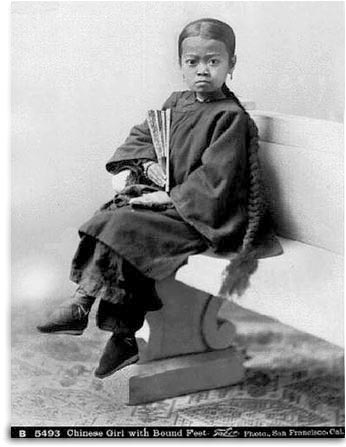
Photograph by Isiah W. Taber, San Francisco.
Mr. Crites ends his article with a pitch for cultural relativism:
"However, let's
not condemn this practice for we cannot judge it in respect to our
own culture. To fully understand a practice such as foot binding
we have to practice cultural relativism. That is we must suspend
our own personal judgment and attempt to understand this custom in
China's own cultural terms. "
Jim@eCrites.com |
I strongly disagree with this, but I think I know
where this comes from. Westerners, mostly religious missionaries,
have had a nasty habit of making judgments about other cultures and
imposing arbitrary rules from their own - instructing women to cover
their breasts, imposing silliness like "the missionary position" on
sexual practices, and generally sticking their blue noses in
where they don't belong. In reaction the sociologists and anthropologists
invented the concept of cultural relativism, the idea that we can't
criticize another culture unless we are part of it. It's a pendulum swing in the other
direction, and I think it's wrong.
I think we can have some very simple rules about what
is good or bad in a culture, and there should be such a thing as
universal human rights that transcend cultures. Among the rules I
would suggest are the following:
1. If the practice creates a class of human beings who have fewer
rights, privileges, or abilities than another class, then it is clearly
wrong. So I can say that I think the caste system in India is
wrong, as was the class system in England or the feudal system in
Russia. I can say that a culture that denies education, or a
driver's license, to women is wrong. A culture that allows the
crippling of children to make them better beggars is wrong, as was a
culture that turned girls into cripples by binding their feet. The
leadership of China made this judgment about foot binding in their
culture, and ended the practice. Obviously they saw it as
wrong too.
2. If the practice is imposed without the free consent of those
affected, I can say that it is wrong. So I think we can speak
against arranged marriages, selling of children into sexual slavery,
genital mutilation of infants (both boys and girls), and foot binding.
To say that we can't criticize another culture is absurd. I can
criticize my own culture, and do. I'm convinced that someday the fact that it is currently legal in Canada to cut off part of an infant
boy's penis with no medical justification will be viewed with horror and disgust. I make
judgments about my own culture, and I'm going to continue to make
judgments about other cultures. Call me judgmental, but you can
keep your cultural relativism.
Comment on this Post
Whip Report
The bull whip is essentially
finished. It came out at ten and a third feet, not counting the
fall and popper. I want to rework the Turk's-heads on the handle.
Also, the leather for the fall turned out to be too brittle. Two
cracks and the popper would break off. I've replaced the cow hide
fall you see in this picture with a kangaroo hide fall, but I'd like to
eventually find something thicker.

I can now demonstrate my
ability to break the sound barrier and everybody seems to be impressed
with the workmanship. Making this whip turned out to be more
difficult and time consuming than I expected, but isn't that always the
way it goes. Such arrogance on my part to think that I can match
the work of a professional who has spent years learning a craft. I
think I came close though. Now it seems I'll have to make a second
whip, just to make use of everything I learned making this one.
That will have to wait until my plaiting induced tendonitis dies down
and I get a couple more kangaroo hides from Australia.
I'm going to write up the whole process soon, and maybe
send that in to a how-to site.
Comment on this Post
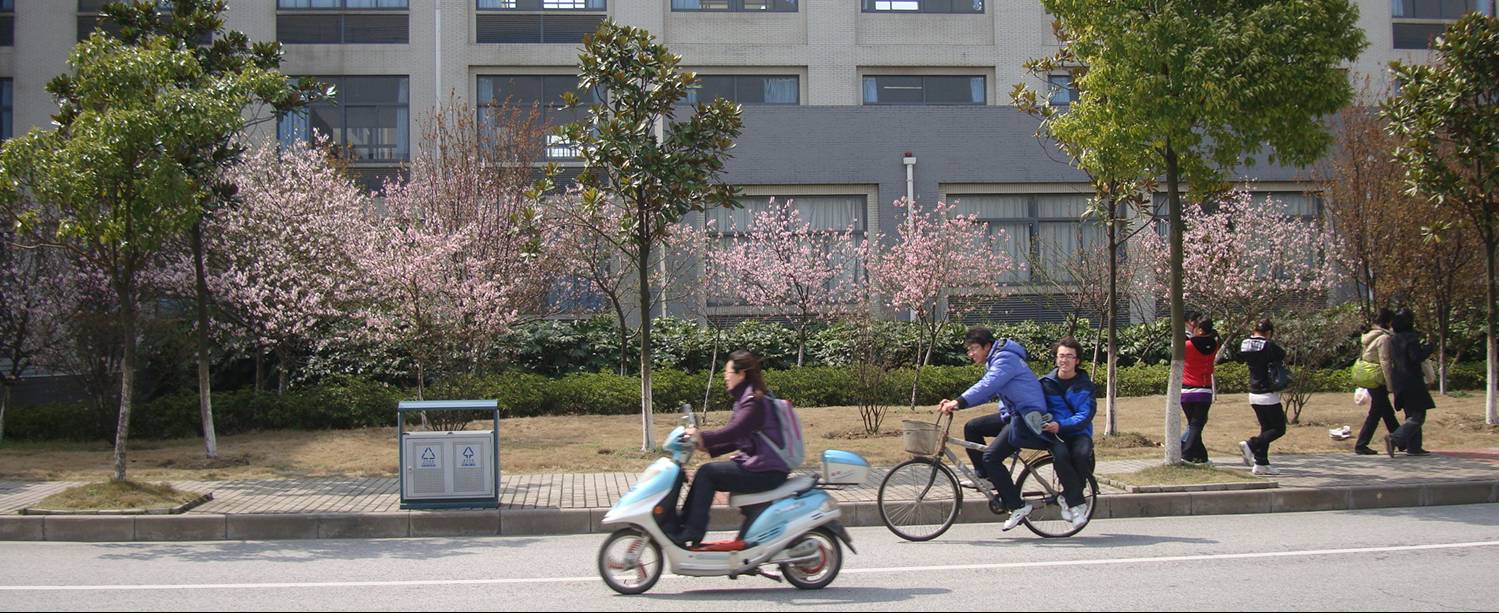
Chinese word of the
day: 乐此不疲
( lè cǐ bù pí literally pleasure this not exhausted) never be bored
- idiom applicable to tedious hobbies like plaiting a whip.
March 27, 2010
Adventures in Teaching English
The week before this last one
I reminded my students of the real reason I'm in China - to help them
learn English. It's easy to forget this sometimes, with all the
interesting things I get to do here.
I usually begin each class by putting up a
fill-in-the-blanks sentence on the board, and have each student complete
the sentence during attendance. That way I'm sure to hear the
voice of every student at least once during the class. This also
lets me get to know the students a bit, and maybe even learn their
names. Below at the top of the black board is the sentence for the
week of March 15:
I asked them what their
biggest problem was in learning English, then corrected the word
"problem" to be "challenge". Let's treat learning a second
language as a challenge, not a problem.

Most of the challenges turned
out to be mere mechanics. To solve them only involves doing the
work - reading, practicing, listening. We can pick up vocabulary
painlessly, without constantly running to the dictionary, the same way a
child picks up vocabulary, by reading and listening and getting the
meaning from the context.

But as you can see on the
board, one student really nailed it: "I don't like learning English but
I have to learn it."
It's hard, if not impossible, to make yourself do
things you don't like or want to do. That's my biggest challenge
as a language teacher - to convince my students that learning a language
can be fun, interesting, exciting, rewarding. To get my students
to love learning English. Learning English turns out to be an
emotional problem, above all else.
Comment on this Post
The Emotional Life
When I was a child it was
widely believed that emotions make for bad decisions. The best
decisions, everybody thought, were made logically, coldly, with no
emotional confusion. This turns out to be nonsense.
With recent discoveries in
brain science and theory of the mind, our understanding of the roll
emotion plays in decision making has been turned on its head.
Without emotions, we can't
make ANY decisions. This now seems so obvious. After all,
things only matter because of emotions. Without emotions, how can
we prefer one outcome over another? We use the more evolved part of our
brains to predict the future. We use the more primitive, emotional
part of our brain to decide which future we would like, and which we
should avoid. Decisions are a logic/emotion partnership.
Many of my students told me that their biggest challenge in learning
English was: "I can't clearly express my feelings." So that
lead to this week's class on the theme of feelings and emotions.

My favourite sentence to come from
this attendance: "Whenever I'm in David's class I feel encouraged."
Thanks Doris.
My students all know these
words. Well, except for archaic words like "gruntled", for which
we now only use the negative - disgruntled. And "ruth", my
fiancée's name meaning "compassion", another real word not recognized by
Microsoft's spell checker for which we only use the negative - ruthless.
I know they can express their feelings much better than they think they
can.
Part of the problem is that learning English has been
made into work for them. Instead of emphasizing communication,
they are ground down with grammar, pronunciation, and memorization of
new words. I can tell you, if I was a young Chinese I would hate
English, and probably hate the foreigners who come here to teach it.
What a drag it must be to be nationalistic and patriotic, to be proud of
your culture and heritage, yet be told constantly that your language is
not the dominant one in the world, and success depends on imitating
foreigners. Yet if they could just come to love learning English,
enjoy speaking English, rejoice at finding a new word or interesting
idiom, how much easier their studies would be.
Comment on this Post
Okay, Class, Get Into
the Formation
I'm teaching mostly oral
English this term, and one of the challenges has been to get students to
interact with more than one other student. If I tell them to
change partners, I'm in for ten minutes of milling around and confusion.

My students "in the formation".
We couldn't do this last term because the classrooms were too small.
But I've got the problem
solved. I get them to take seats along the edge of the rows of
desks. When my alarm goes off, after five minutes with one
partner, the outside line simply stands up
and moves back one desk, and the end of the line comes to the front.
Viola. Instant partner change.
Comment on this Post
Speaking of Viola
Two years ago I bought my
Burmese bird's eye maple violin from the violin maker in Shanghai.
I love that instrument, probably more for its looks than its sound.
Last Sunday we did a day trip into Shanghai to help our friend Marion
find a case and bow for her violin in Australia. So we went to the same
shop where I bought my violin and there, on the rack, was a Burmese
maple viola. I fell instantly in love with it's deep rich tone,
but I would have bought it just for its looks. So now I have a
matched set of violin and viola. Does life get better than this?

Comment on this Post
Here are a few
pictures from our day in Shanghai.
 |
 |
|
Marion with her new violin case. |
Worlds most elegant portapotties. |

A Muslim meat market in
Shanghai. Interesting deboning happening.

Everything from crickets to
parrots, but no snakes.
 |
 |
|
The Chinese seem to be very
fond of turtles. This prehistoric critter was for display only.
Not for sale. |
This is a chinchilla. I
had one as a pet when I was a pre-teen but I've never seen one in
a pet store. |

A barber at work in Shanghai.
Very low overhead.

Kung Fu in People Square,
Shanghai.
After wandering through the Shanghai pet market and antique street with
Marion, we ended the day having dinner with Marion and two of our
favourite students from our classes at Harbin University in Weihai.
Jenny and Simon were seniors when we taught in Weihai. After
graduation they moved to Shanghai. They recently married, and
showed off a book of wedding pictures that were simply amazing.

Former students, Jenny and Simon, now
married and living in Shanghai. Congratulations.
Things you Don't Read
in the Western Press
I came back from the five
minute break between periods to find the monitor making an announcement
in Chinese and the students all clapping and cheering. I asked the
monitor to tell me what was happening in English. He told me that
the class was supporting four poor students in an impoverished western
province. They had just had news that one of the students got very
high marks on his exams, and that's why they were cheering. You
gotta love these kids.
Comment on this Post
Whipping Along
I'm making progress on the
bullwhip project, but it's certainly been tedious. There's a lot
more to an Australian bullwhip than meets the eye. The one I'm
making has five layers - a core of four strand plaited kangaroo leather,
covered by a bolster (a solid leather wrap), covered by an eight strand
plaited belly, covered by a second bolster, and finally the sixteen
strand overlay. Whew. Its been a steep learning curve.

My improvised cutter and sixteen
strands of kangaroo hide lace, each about twenty feet long.
I've plaited the transition
from the over one under one handle pattern to the under two over two
thong pattern at least five times. Three times because I wasn't
happy with where it ended up, and a couple of times more because I made
a mistake and had to undo it all. No matter. This hobby is
pretty much over when this whip is finished, at least until I can afford
some more kangaroo leather. So there's no need to rush. Come
to think of it, there's no need for a bullwhip either. I certainly
am subject to strange obsessions and compulsions.


I just knew that ring on our ceiling
would come in handy someday.
I think the whip is going to
be a thing of beauty. At least it looks good so far.
Comment on this Post

Chinese word of the
day:
印象深刻
(yìnxiàng shēnkè literally "print image deeply") = impressed.
March 16, 2010
Whipping it Into Shape
The whip making project has
been soaking up my spare time this past week. It's been a great
adventure. I now have an email buddy in Australia who is an
experienced whip maker. He's been sending me tips and photographs
of his work.
I've been making my first
bullwhip from the kangaroo hides I bought down under.



There's a lot more to an Australian
bullwhip than meets the eye. Mine will be five layers - a four
strand plaited core, a bolster, an eight strand plaited belly, a second
bolster, and finally a sixteen strand plaited overlay. It's fun to
do something with my hands again.
One formula for a whip called
for a lead shot loaded belly, but I can't find lead shot in Wuxi,
though I'm sure it must be here someplace. Another instruction called
for an eight inch bridge spike to start things off, but I couldn't find
one of those either and settled on a long bolt as a substitute. It
took a ride to the 招商场 (zhāo shāng chǎng - attract business market") to
find something as common as a C-clamp. There doesn't seem to be a
do it yourself tradition in China, and tools that are very common in
Canadian hardware stores are hard to find here. I'm planning to
post the whole whip making process once it is completed.
More on this later.
Right now, let's talk about
Chinese culture.
Comment on this Post
The First Words We
Learned to Read
|
In Australia we were
given a book written by an ex-patriot Chinese,
"Mao's Last Dancer" by Li Cunxin.
It's a fascinating story of a poor peasant boy who grew up
during the cultural revolution, was chosen to train in Madame Mao's
Dance Academy, and defected to the West after Nixon visited China.
One thing that impressed me, of many, was his account of going to
school in the 1960's and the first sentence he learned to read:
"I love Chairman Mao".
|
 |
|
I asked my students last
week what the first sentences they learned
were. One response:
"I am a Chinese. I love my country." Another was "My
mother loves me. My father loves me. I love my mother and
father." |


Contrast this with the first
sentences we learned to read. "See Dick. See Dick run."
Our primer emphasized independent action, not emotion or
connections. The connections were there and implied, but not
expressed. Our culture is all about individual actions, with or
without others involved. The Chinese culture is all about
community, connection to family and country.
I'm not making a judgment
here. Frankly, I prefer my culture. Western people tend to
find emotional expressions of love for family or community a bit
embarrassing, even cloying, except on special occasions like weddings
and funerals. It's stating the obvious. I think my family
connections were intense enough without my primary school education
re-enforcing them. But it is interesting to note the difference
between my culture and the Chinese culture. Maybe this is why we
find our students such sweet people.
Comment on this Post

March 08. 2010 Settling
in and Welcomed Home
Chinese word of the
day: 公牛
鞭子
(gōng niú biān zi ) bull whip (I'll start making one as soon as I
can find a bridge spike and some lead shot.)
What a surprise. A
knock at the door this afternoon and there was a delegation from the
administration, lead by our favorite boss lady, with some "Women's Day"
flowers for Ruth.

It's this kind of thing that
makes us feel so good about living and working here.
First Chinese Class of
the New Term
The welcome home contined
when Wang Yijing came for our Chinese class, bearing gifts to bring us
happiness and prosperity in the Year of the Tiger.


This traditional Spring Festival door decoration should be read in the
ancient way - right to left, top to bottom.
The right hand side of door
reads:
金牛踏祥云百事通顺 (jīn niú tà xiáng
yún bǎi shì tōng shùn) which is to say "Golden cow step on propitious
clouds hundred things become no barrier smooth."
Across the top reads: 万象更新
(wàn xiàng gēng xīn) "One thousand images change new", which is idiom
we're told means best wishes for the future.
The left hand side of the
door reads:
玉虎添新翼一家拼安 (yù hǔ tiān xīn yì
yì jiā pīn ān) "Jade tiger add new wings one family safe."
And Our Dog is Home

Our friend Panda took Gou Gou
to her home for the Spring Festival Holiday. While we were in
Australia, GouGou was in Hebei Province having a holiday of her own.
Separate vacations. They arrived back about four on Saturday
morning. Good to have our dog back in the pack.



Somber Weather but
Green Leaves
The weather in Wuxi since we
got back from sunny Australia has been rainy and very dull. One
might say bleak. But we went for a walk to the peninsula in the
little lake, and you can see fresh green leaves on the willows.

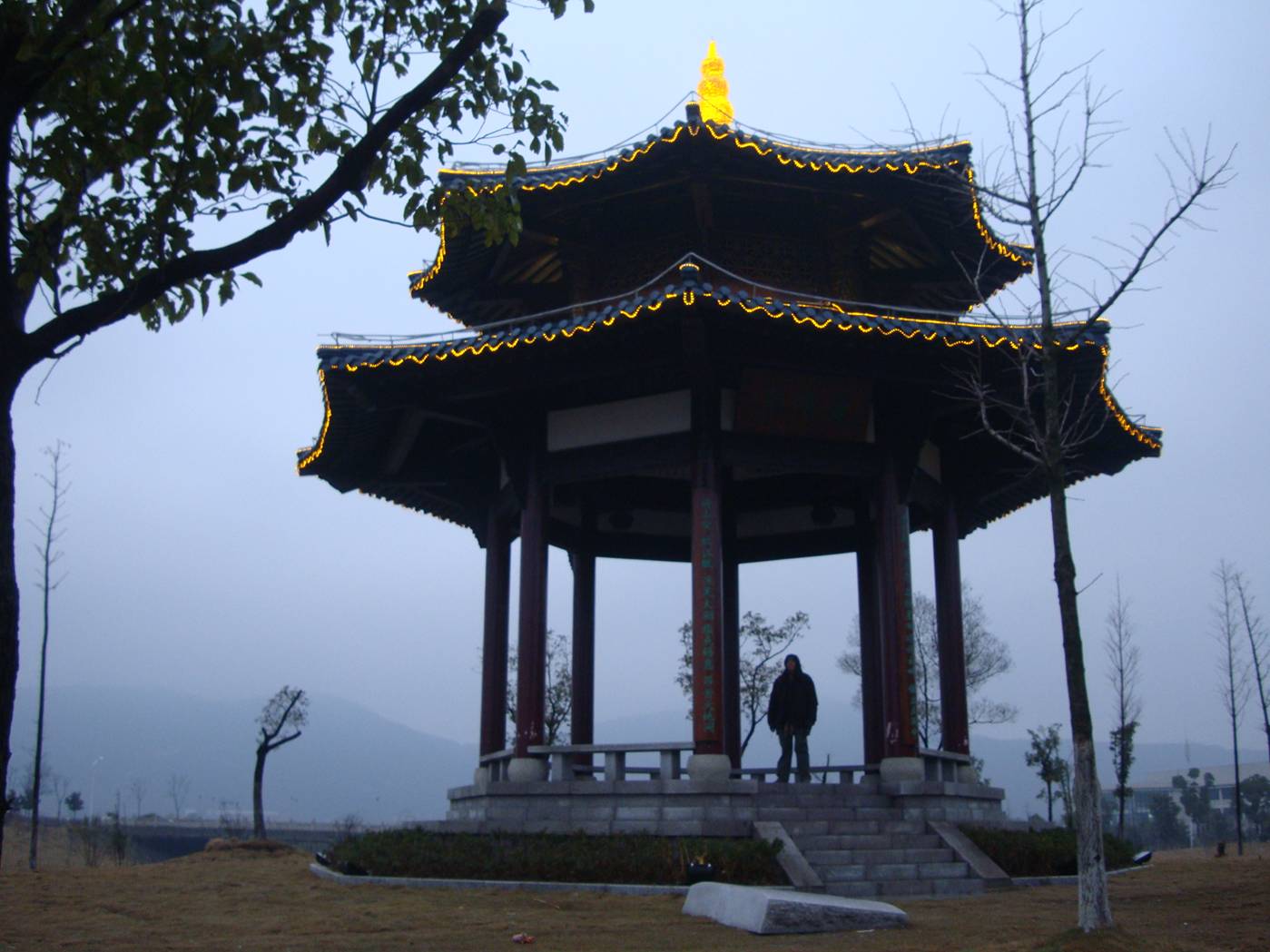
We ended our fast (For our students, a fast means going completely
without food.) on Friday evening. Six days, minus a couple of
hours, ingesting nothing at all except water. It was an
interesting experience. I shed a bit of the belly I brought back
from Australia, and if I can change my eating habits the fat should stay
off.
There's a lot of controversy over the merits of
fasting. Some claim it will cure everything including cancer.
Others, mostly in the mainstream medical profession, say it is of no
value at all and actually dangerous. I can only judge by how I
feel, and the results I got. Right now I have nothing negative to
say about the experience. I won't claim that it made me feel super
healthy, but I felt good, even on day six. Just taking control of
my body for a week seems to me to be worth doing.
 |
Every time we go out we
notice little improvements to this campus, like these new trash
bins. They might not be absolutely necessary, but touches
like this sure make the whole university feel upscale. |
There's
been a lot more going on than I've posted, including a Sunday trip in to
Shanghai. But this is really going to be tedious if I post
everything. I have two classes tomorrow morning. Time to
check my lesson plan and get to bed.
Comment on this Post
March 02, 2010 Back in
China

Chinese word of the day: 绝食
(jué shí v.o. literally absolutely cut off + eat) = fast, go on a
hunger strike
Ruth and I returned home to
Wuxi on Saturday after a smooth and uneventful flight. I never
cease to marvel at air travel. To be sitting in a comfortable
armchair, eating snacks and watching a movie while seven miles in the
air and traveling at 700 miles per hour continues to amaze me. It
humbles me to think that the Wright Brothers flew a few hundred feet in
1899, and all of this has developed in the brief period since. If
I had been there at Kitty Hawk I would never have imagined where we
would be today. Taking the world we live in for granted seems impossible
to me.
I returned from Australia with a
head full of wonderful memories. We were treated with such warmth
and hospitality by Marion and Bernie and Andrea and Kirsten and Ann and
Don and Hank and Gretchen and all the other wonderful people we met
there. Thank you all.
We got up in time on Sunday morning to see the U.S.
team score the tie goal in the men's Olympic gold hockey game, and then
got to watch as the Canadians took the gold in overtime.
Unlike
in Canada where the top of the list is the total medal count,
in China they report Olympic medals with the number of gold medals at
the top of the list. It was a thrill to see Canada in the top
spot for Olympic gold in Vancouver.

My first phone call was to
Dr. Chen, my dentist. I needed to get a front tooth cap glued on
again. Ruth decided to come along for a cleaning. It took a bit of time
to track down Dr. Chen's new working address, but we got there.
It's comforting to know that western style dental care is available in
Wuxi, at a price that's a fraction of what it would cost in Australia or
Canada.
Comment on this Post
(Please. I very nearly removed the blog function from this site
because all I was getting was comment spam, but I've got a plug in
activated now that takes care of that. I would love to hear from
you. Just say hello and let me know you dropped in, okay.)
Warning:
Irrelevance Alert
What follows has
nothing to do with China, other than that we live here. So if you
landed on this site looking for information about teaching in China,
Wuxi, or Jiangnan University, please scroll down to previous entries or
visit the site archives.
Fast Forward
Ruth and I are on a fast.
Eating no food at all. Just water. This is nearing the end
of our third day. I haven't done a fast for many years. I
think my last one was in the early eighties and lasted for twelve days.
For this one I'm aiming for five or six days, because we start teaching
on Monday.
Why a fast? We sent an
email to Bernie, our Australian host, saying that without his cooking it
just didn't seem worth our time to eat. This is almost true.
But after a holiday spent eating and drinking quite freely, we both feel
like we need to detoxify and change our eating habits.
How hard is it to fast?
So far not hard at all. I had a bad headache yesterday, but today
I'm feeling pretty good, if a bit low energy. Ruth and I both did
the morning workouts on the elliptical trainer and though our calorie
count is dropping, we're still hanging in for half an hour.

What am I hoping to achieve?
A bit of belly loss would be nice, but I know that it will come back
instantly once I start eating again. To lose fat for good takes a
dietary and lifestyle change. So really we're out to change our
eating habits. When we come off this fast, we want to eat smaller
portions, with a higher percentage of vegetables and less meat.
I'm tempted to go vegan, but I don't think I'm quite ready for that.
One thing I know for sure, I don't want to reward myself for fasting by
going on a binge when it's over. I have an investment in this.
Comment on this Post
My New Hobby (As if I need another one!)
I also returned with a new hobby. Don't laugh. Or go ahead
and laugh if you want to - I'm not afraid of being absurd. Here's
the slightly embarrassing thing: I'm learning how to make whips,
specifically the wonderful bullwhips for which Australia is famous.
You may not know this, but any time you see a whip in a
movie, it's an Australian whip. Indiana Jones carried an
Australian whip. I bought one in the late seventies, and didn't
realize how good it is until I got looking for a new one in Australia.
My old whip is a cracker, a thing of beauty. But it is old.
I wanted a new one, but couldn't find what I liked on this short trip to
Australia. Then I realized I'd rather learn how to make one
myself. So here goes.

I bought these two kangaroo
skins from a leather dealer in Melbourne. Kangaroo leather
is amazingly strong. I cut a strand only an eighth of an
inch wide off these hides and couldn't break it with my hands.
Neither could anybody else I handed it to. |
I also bought a strand
cutter. So below you see my very first attempt at plaiting
eight and sixteen strands.
 |
It seems I'll be able to make something that looks a lot like an
Australian bullwhip. The trick is going to be building the belly,
the core of the whip that determines its handling characteristics.
That is going to take some research, and probably a failure or two.
Comment on this Post
February 22, 2010 and
Tourist in Australia

Chinese word of the
day: 鸸鹋
(ér miáo) = emu



We've been enjoying a
wonderful holiday in Australia, watching the Winter Olympics on TV and
cheering for the Canadians, Australians, and Chinese.
Congratulations to the
Chinese medal winners: Yang Zhou taking gold for Short Track in
the Women's 1500m, Meng Wang taking gold for Short Track Women's
500m, Beixing Wang taking Bronze for Speed Skating Women's 500m., Xue
Shen and Hongbo Zhao taking gold for Figure Skating pairs, and Qing Pang
and Jian Tong taking silver for Figure Skating Pairs.


We watched Xue Shen and
Hongbo Zhao's performance and they were beautiful. Congratulations
to all the Chinese athletes.
Comment on this Post
Chinese Tourists in
Australia
We were surprised to see the
number of Chinese tourists here in Australia. Chinese prosperity
is giving opportunities unheard of just a few years ago.


We had some Chinese
conversation practice every day of our holiday within a holiday, our
road trip down the Great Ocean Highway.

This
guy was taller than me, and no doubt has a few pounds on me.
He does about twenty feet in a hop.


I was a bit intimidated by the thought
of driving on the "wrong" side of the road. Turned out to be less
confusing
than I'd expected. Biggest problem was hitting the wiper switch
instead of the turn signals.




I had
no idea that Australia had trees are big as our B.C. cedars.
The dappled light in the rain forest is beyond beautiful.
Comment on this Post
February 04, 2010 Australia Report in
Brief

Australia is awesome.
Awesome food. Awesome scenery. Awesome people. Check
out Ruth's
Flickr site for a lot more pictures.
Comment on this Post

January 30, 2010 Didgeridoo Yer Website
Chinese Word of the Day: 都下不了脚了
(dōu xià bù liǎo jiǎo le literally "all not less than foot") = no room
to put down feet/ room is a mess.
So, here we are in Australia.
It's been great. Perfect summer weather but not too hot.
Beautiful country reminiscent of the foothills of the Canadian Rockies
at the best time of year. I'll be posting more vacation pictures
in a day or two. But for now, just double click on the banner
picture to hear the didgeridoo player. It's Australia.
 |
The other day we were in the Chinese part of Melbourne and found this
sign on a cafe wall. Ruth was so tickled to be able to read the
Chinese characters, and get the joke that obviously is only intended for
Chinese speakers.
"Special pork Bun" translates as 狗不理包子 (gǒu bù lǐ bāozi) or "dog not in
bun".
|
Comment on this Post

Chinese Word for the Day:尊重宗教信仰
(zūn zhòng zōng jiào xìn yǎng) = respect religious belief
January 21, 2010 Tie Me Kangaroo Down,
Sport
We're off for Australia. We have a friend in a small town near
Melbourne who has offered us refuge in her house, plus the use of her
swimming pool, wood fired pizza oven, and car. Wow. There's
no other way we could afford to see Australia, and certainly no better
way than to have a friend to visit.
I will be posting from the road, but for the next five
weeks, the man in China will be in Australia.
Comment on this Post
Extreme Dining
Extremely elegant, that is.

Last night the Foreign
Languages administration again treated us to a dinner, a celebration of
the start of the Spring Festival holiday. After five years in
China they can still feed us things we've never had before.


I could recognize the sea cucumber on
the right, but what was that dish on the left? (mouse over to find out)

It's an international crowd. The
former judge and his wife from America, the Japanese teachers,
the Russian dance teacher and her son, and our Chinese hosts.
Munching this gourmet food we
all agreed that Jiangnan University is the best place to work in China,
if not the world.
Comment on this Post
Student Opinion Poll Continued
Last week I told my students
about the Danish cartoonist and asked them whether the paper should have
been allowed to publish the cartoon. This week I told them about
France banning the hijab, the Muslim scarf, and other religious symbols
in public places. This week's question: Was France right to ban
the wearing of religious symbols in public.

The vote: 16 to 7 in favor of authoritarian control. As
I said before, this is their culture and they like it the way it is.
Those who said France was wrong often stated that we
should respect religion. I asked them why, and explained that I
respect people's right to believe whatever they want, but I don't
necessarily respect their beliefs, or their religion. I don't know
how they deal with the cognitive dissonance caused by believing in a
loving God who will punish me with eternal damnation in the fires of
hell simply because I don't worship him. Strange concept of love.
And when religious people say things that are absolutely stupid, such as
the American evangelist who told his followers that the earthquake in
Haiti was their own fault because they made a deal with the devil, I can
see no reason to respect them at all.
Because they know that I'm not fond of religion, my
students were surprised to learn that I think France is making a
mistake. To me it seems to be religious groups that want to take
away our freedom of expression. If we take away freedoms in
reaction, then the religious fanatics have truly won.

As a follow up I asked their
opinion on capital punishment. While a few students felt that
capital punishment is wrong, there were no votes critical of the recent
Chinese execution of the British citizen.

A bit more cognitive dissonance with
this class. Fifteen to nine against capital punishment,
but only five to eighteen critical of China's decision to execute the
British drug smuggler.
And this let me explain the concept of cognitive dissonance.
Comment on this Post
Chinese Word for the Day: 反话
(fǎn huà literally "opposite speech") = irony
January 14, 2010 Irony
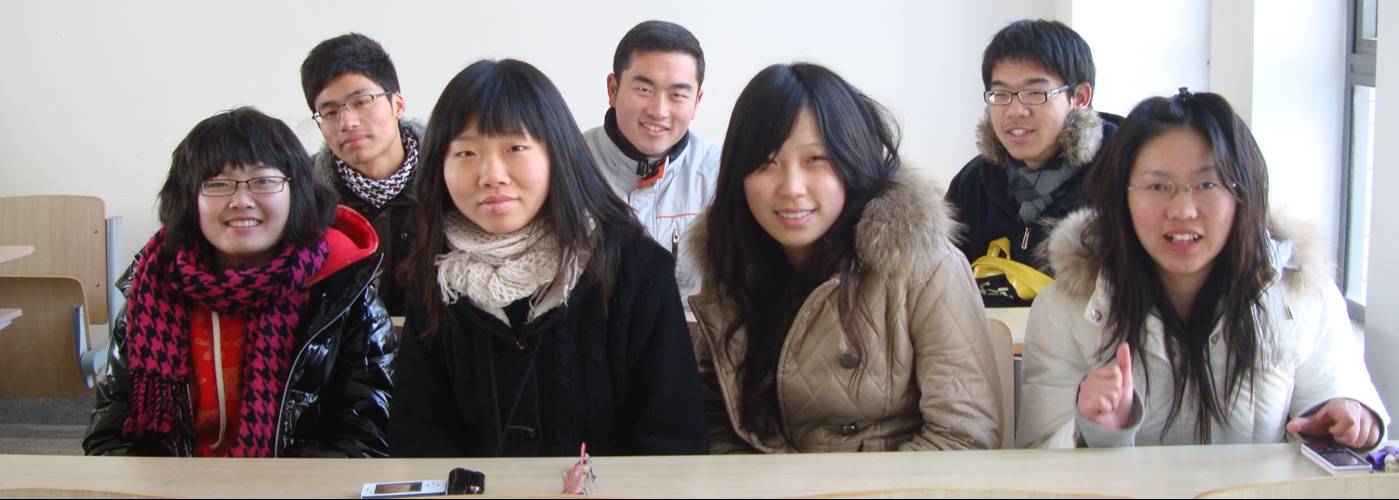
Looking back five
years to before I came to China, I realize that I came to this country
with an expectation that the Chinese people would be miserable.
You know, repressive communist dictatorship in power. No freedom.
People can't say what they think about things. But what I found
here was a mostly very happy people who laugh a lot and really enjoy
life. It's been a puzzle. According to what I've always been
told in the West, the Chinese SHOULD be unhappy. This week I think
I have discovered at last a part of the reason why they are not.
This is their country, and their culture. They like it. They
like it just the way it is. Why in the world would we in the West
expect anything else?

Fairly recently a fanatic broke into the home of Danish
cartoonist, Kurt Westergaard,
and attempted to kill him with an axe and a knife
in front of his five year old grand daughter. They survived by
barricading themselves in the bathroom "panic room" until police could
arrive to save them. This is
all part of the continuing brouhaha over the cartoon Westergaard
drew that was published in a Danish newspaper. The cartoon itself
was part of a discussion of
freedom of expression and
self-censorship in the face of violent reprisals against artists,
including the murder of a Dutch film maker, by fanatical followers of
Islam.
This past week I told my students the whole story of
the Danish cartoon. I explained that it caused no initial outrage
by itself, but "religious leaders" later took the cartoon, added
other material that had nothing to do with the discussion, or with Islam
for that matter, and then went to Muslim countries to instigate protests
and riots. Danish embassies were attacked. In all, something
like a hundred people ended up dead.
I
asked my students this question: Should the newspaper have been
allowed to publish the cartoon?

It wasn't a unanimous vote by any means. But every class came
down solidly on the side of NO. The press should not have been
allowed to publish the cartoon.
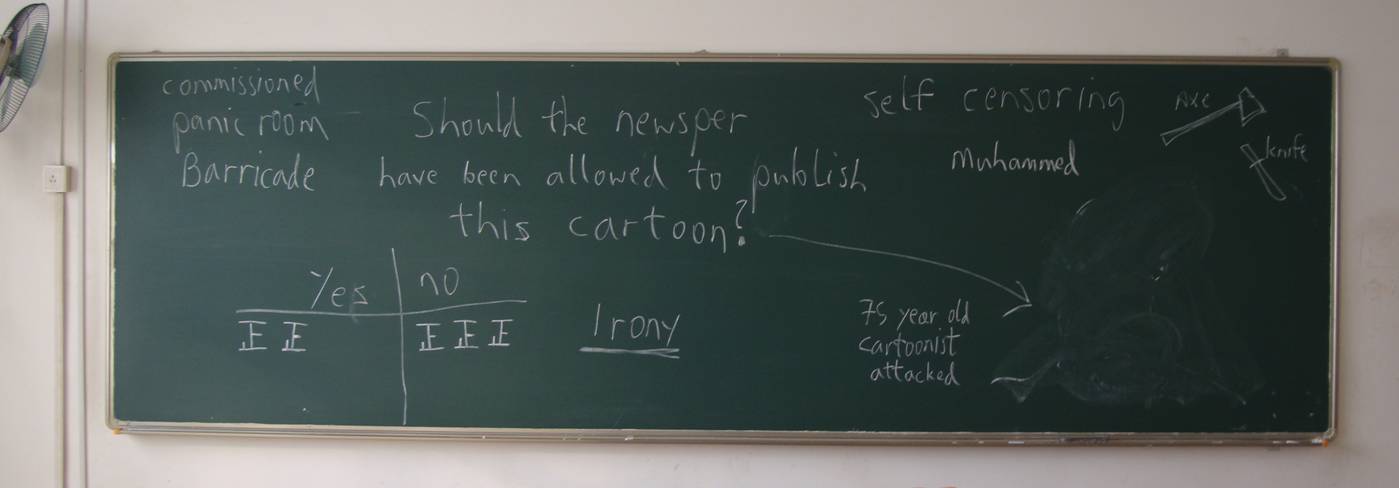
This lead to a very interesting discussion. I'm
not allowed to talk about Chinese politics here, and wouldn't want to if
I could. But this is talking about Denmark. Besides helping students develop language skills, I do see my job to be helping them appreciate and understand Western culture.
So I had to explain a few things such as:
1. There is no authority in Denmark that could forbid publishing
the cartoon.
2. Most Western countries have laws against hate crimes, but
those must be promoting hatred and violence, not just commenting on it.
3. Western democracies believe that freedom of the press is
essential for a healthy society, and that controversy is acceptable as
long as it is restricted to words and ideas.
4. Political cartoons are supposed to upset people and mock ideas
that some people care about. If people are setting off bombs in
the name of Islam, as seems to be happening in various places in the
world, so that the entire religion is now associated with terrorism,
isn't this a legitimate statement for a political cartoonist to make?
I also got a chance to explain the meaning of the word "irony".
What could be more ironic than a religious groups reacting to the
suggestion that they are violent by storming embassies and rioting, and
by trying to kill the man who made the suggestion with an axe.
Comment on this Post
Goodbye to Google in China
 |
All of the
above post becomes more relevant with the news that Google has decided to
withdraw from China. I have to say good for Google. I think
this was the right decision, given the recent tightening up of
communication over the Internet in China. But I use the search
engine many times every day, and the thought of Google abandoning China
is more than a little disturbing.
I asked my students if they knew why Google is
threatening to pull out of China. Much of the reporting of this is
blocked on the Chinese Internet. They knew about the hacker
attacks on Google, but they seemed unaware that at least some of those
attacks were aimed at getting information about human rights activists.
|
I'm trying to reserve the word "tragedy" for events that really deserve
it, such as the recent earthquake in Haiti, events which cause
people to die. Google leaving China is not a tragedy. But it
will be a loss for Google, and a terrible loss for the Chinese economy
and the Chinese people. Google is living up to its motto (Do no
evil), and gaining a lot of very valuable public support. China is
destroying much of the good will it generated with the Olympics, to no
long term purpose that I can see. So, maybe not a tragedy, but a
terrible shame and a great pity.
Unfortunately I can't seen any solution, at least in
the short term. China can't be seen as backing down to a threat by
a foreign company. Google has to stick by it's decision or lose
all credibility in the Western world. My guess is that Google will
leave as promised. After some face saving compromises on both
sides, Google may come back. Or China may reconsider the reform
and opening up policy. But any time China has taken an
isolationist position, the Chinese people have suffered for it. I
hope the Chinese leadership will see that they can't have the door open
while keeping the screen door locked.
Comment on this Post
Chinese
Word for the Day: 导盲犬
(dǎo máng quǎn literally guide blind dog) = seeing eye dog
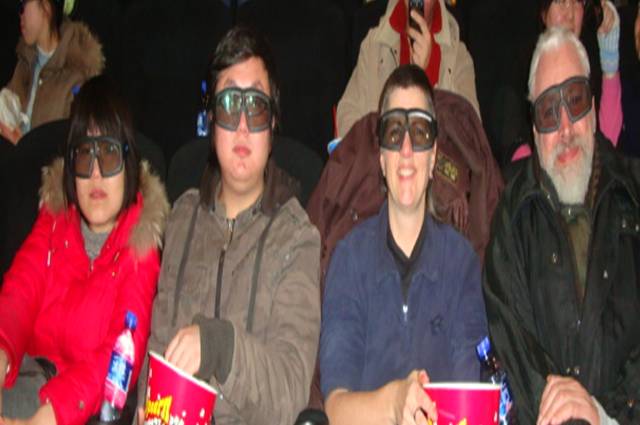
January 09, 2010 Minds Blown in
Imax 3D
Spoiler alert: Giving away story
points for Avatar is hardly spoiling anything. The story is
strictly formula and very predictable. That’s not what makes the movie
work, and it works very well indeed. But you should see Avatar
before you read this.
Avatar
- the perfect fantasy for a
juvenile species
We’ve just come out of
watching Avatar, in Imax 3D. What a beautiful movie. What
amazing visual effects. What astonishing technical achievement. What
great performances. What a nice solid and politically correct story
line. It's
a new benchmark for cinematic achievement.
Such a shame that it throws away it's true potential.
It could have been a great movie. Everything is there except the
heart and brains.

Avatar - religion
with a reality that actually makes sense. What a concept.
Avatar has everything
the classic formula demands. Greedy industrialists, avaricious
despoilers with no respect for anything but money. Thuggish military,
but with one redeeming member, a woman of course
(Everybody knows that men are not nurturing.) who has a big heart
and won’t follow orders. Incredible war machines, including the big
walking robots from Alien now revisioned as foot
soldiers. Religion that is actually founded in
reality and makes sense. A nice ecology message set in a beautiful
primordial forest decorated with gorgeously bioluminescent plants,
hideously dangerous beasts, and handsome noble savages with a deep
spiritual connection to nature and reverence for life who somehow live
in total harmony with their terrifying jungle mates. Bloody battle
scenes with white knuckle acrobatic combat and aerial eye candy.
True to the formula,
the villain dies in one-on-one hand to hand combat in the penultimate
scene. Oops, make that one on two. Times have changed. The heroine is
no longer just a “yankee”, the helpless feminine fluff yanked through
the sets by the hero, the yanker. Today’s female hero has a more active
part. She gets to save her man and kill the bad guy. Actually, in this
movie she gets to kill the bad guy and save her man twice,
no, three times counting their first meeting.
This is a new and improved formula, and who could object to that. The
allegory is beyond obvious. It’s us, the people of the developed world,
against the rain forest people. And whose side are we on?


James Cameron has obviously done it
again. The movie is breaking all box office records, and is going to be
the biggest hit in movie history, right after Titanic by the same
director. Bravo. Bravo. Go and see it. In fact, go and see it
twice. It’s worth it. I truly and sincerely really loved it. Go and
see it. And then think about it.

Avatar is an
incredible ride and great fun. But all the
warm and fuzzy justification for hard hitting combat in which good guys
and bad guys get to kill each other in thrillingly acrobatic ways leaves
me profoundly dissatisfied. So, here’s how I would throw away all that
box office success and make this movie into a record breaking money
loser. Yes, I would do this. No question. And I would do it gladly,
on purpose. Screw the investors. Let’s finally get one thing right.
We don’t need a battle scene to end this beautiful movie. It deserves
better.
Sure, the battle scene is the big payoff. But is it
worth it? Do we really need to feed our
children this vision of humanity, where the only choice is between kill
or be killed, fight or surrender? What
about…. What about Gandhi’s solution? Why couldn’t the forest people
beat the invaders with public relations and passive resistance. In
every place on earth where this kind of conflict is currently underway,
from the Congo to the Amazon rain forest, that is the only hope for the
indigenous people. They don’t have a prayer with military solutions. Bows
and arrows, even when fired from flying dragon creatures, don't do much
against machine guns, as the British demonstrated with the charge of the
Light Brigade. Hunter gatherers are out gunned and over
powered by our high tech culture. But they can still win. They just
can’t do it with battle scenes.
I know this is a money loser, and doesn’t get the
adrenalin up with lots of death and killing and oh such sorrow as
characters we care about.
and wonderful flying animals
we care about even more,
bite the dust. But it’s a viable alternative. Isn’t it time we
acknowledged this? Isn’t it time we stopped feeding our kids simple
minded cowboys and Indians endings?
Let me take you back to the movie for a moment. The
great tree/village
has been destroyed, the home of the ever so
spiritual forest people. Now the human military machine is poised to
move in and wipe out the tree dwelling savages. Our avatar hero has
tamed the colourful big boss flying
critter. He’s ready to make his pitch to the
tribe. How about he has a brain in his head? An actual idea? A
realistic answer to the problem? How about he finds a solution that
would avoid virtually ALL of the bloodshed and horror?
Here’s how it plays
out: He calls the tribes together. Tension is building. The military
is getting trigger happy. And then…. The forest people lay down all
their weapons. Twenty thousand of the elegant blue humanoids simply
walk toward the “sky people” camp. The are pleading. They are
defenseless. They are harmless. But there’s an awful lot of them. If
a machine is sent out to move them, they lie down under its treads and
passively die. You see? We can still get our
sympathy points. Now tell me, what is Colonel America going
to do in the face of this? Are his grunts going to slaughter these
people?
Ruth says for this to work you need media coverage.
Well, folks, it’s a movie. Let’s add media. Let’s add reporters and
cameras. There are human beings involved, with human feelings. Don’t
tell me they will all go along with the destructive corporate rape and
pillage.
The answer for the forest people is not fight and die,
lose everything versus win and save our
homeland. The answer is meet the enemy and make a deal. There’s a win
win situation here, and it doesn’t involve killing anybody.
I know, I know. This is why I’m teaching
in China and James Cameron is making block buster movies. But you know
what. I don’t care. I’m sure he has a lot of fun with all his toys. I
have a lot of fun watching what he does. And I don’t have to feel like
a traitor to my own intelligence and the intelligence of my species.
There are lots of other criticisms of the Avatar story
points. Why, for example, didn’t the marine on their team teach the
forest people some tactics. Surely spears thrown into those helicopter
rotors would be a better idea than flying straight into their guns,
especially when you can have a high ground advantage. But I’ll let
those things go. They are trivial compared to my big complaint. How can
we possibly end violent military conflict here on this amazing planet if
we can’t even find a good solution in our best and
most expensive fantasies?
Comment on this Post
Chinese Word for the Day:
你赶火车吗?
(nǐ gǎn huǒchē
literally "You catch a train?") =
You've got a train to catch?
You're in a hurry? The same thing we
might say if somebody is in a restless hurry.

January 06, 2010 (yikes! Already?)
Another Term Begins
This year we are doing two weeks of the next term before the Spring
holiday. Here's my new
schedule for students who want to audit
any of
my classes. Visitors will be welcome unless it gets too
crowded.
Into the Next Decade
Anybody who is bored in this world just isn't paying attention.
Blasphemy is now illegal in Ireland, with a 25,000 Euro fine for
intentionally upsetting any religious group. The Irish atheists
are fuming.
Atheist Ireland
published a list of 25 blasphemous quotes. What fun.
I note with some pleasure that religion doesn't seem
to get a lot of respect on my corner of the Internet. Here's a
recent
Abstruse Goose
web comic that pokes gentle fun at the believers.
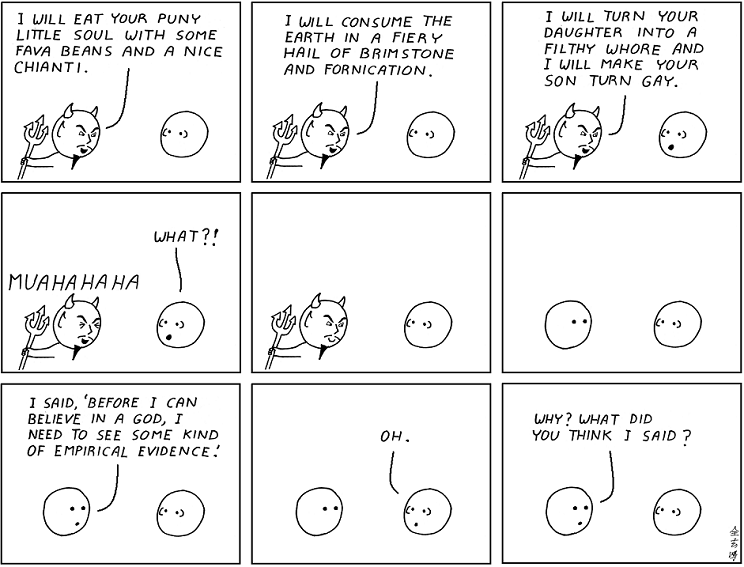
This prompted quite a few comments
from a user group I belong to, including these:
>
Is that what they hear when we explain our world view?
>I doubt if it’s as simple as that. I
imagine some religious type might have that sort of reaction,
but I’m sure not most, and then
there are probably some atheists out there who have
comparable reactions when a
religious person talks about their perspective.
And that inspired me to put
together my own comic, with apologies to Abstruse Goose and the late
George Carlin. Call this an homage.
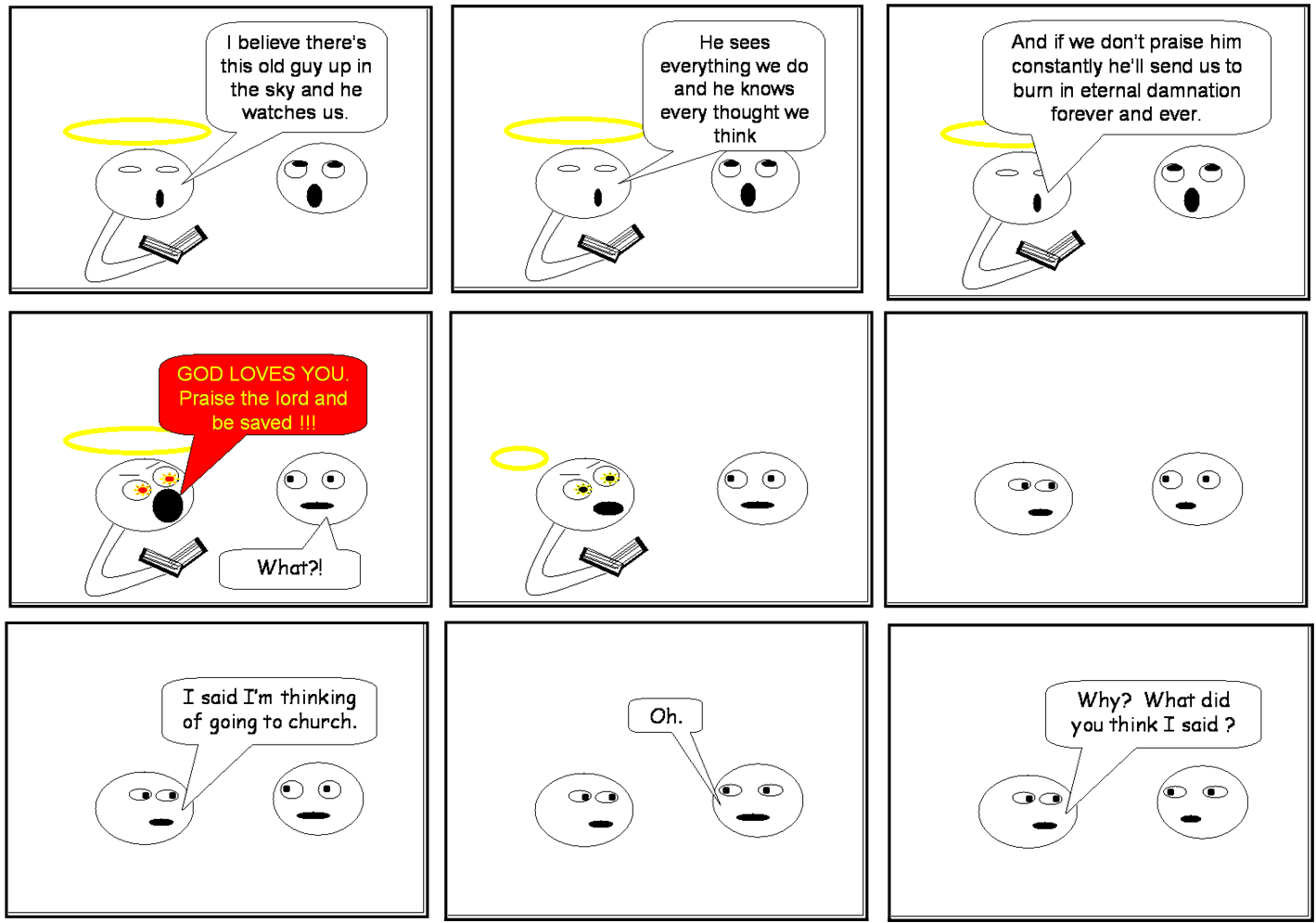
When I was a teenager, many adults got very upset at seeing a boy
with long hair or an ear ring. Some of
them, including my father on occasion, got
violently upset. Personally I think freedom of expression includes
the right to upset people. Especially when people are irrationally
touchy. Blasphemy is NOT a hate crime.
The word does not belong in the law books of any modern nation.
Comment on this Post
Here at Jiangnan University in Wuxi, China, life bubbles along.
It's been over a week since I posted any thing.
My excuse is I've been dealing with the
end of the term paperwork. Last night I finished the lot of it.
Ruth has been having a great
time with on line tutorials, teaching herself how to create web pages
using HTML. This will give her incredible control and flexibility, not
to mention a deeper understanding of website creation. I'm looking
forward to going that route myself, once she has blazed a path.
Today we've got an
appointment to do some assessments of students for the administration.
We were expecting to do this just as a thank you for all the nice things
our admin does for us, but yesterday we got a phone call telling us
we'll be paid for our time. With our plan to spend our
winter vacation in outrageously expensive Australia, a bit of extra
money is going to help a lot. Our
administration makes us feel valued. Sure makes this a great place
to be working. Thanks again, folks.
Comment on this Post
Are you Ready for Chinese Handwriting
Wang Yijing, our Chinese teacher, wrote this
message on our whiteboard. He told us that this is a sample of
Chinese hand writing, and he even claimed that it could be read by any
Chinese person. Could have fooled me.

We tested this assertion on our Chinese friends.
They
could actually read it, and added the line of
character below the scribble.
Much to our amazement.

Both the scribble
and the characters below it say 新春 愉快 (xīn
chūn
yú kuài - "beginning of Spring happy")
Can you see the characters in the scribble? I can, but I'd never
be able to "in the wild".
Comment on this Post
Time to archive again:
So soon. So much has happened in
the past few months. The really good stuff is in the archives,
folks. I hate to bury it back there, because I fear that
nobody will ever click on the links. But you should.
Really. I promise.
Top of page
The Man in China archive index
























































































































